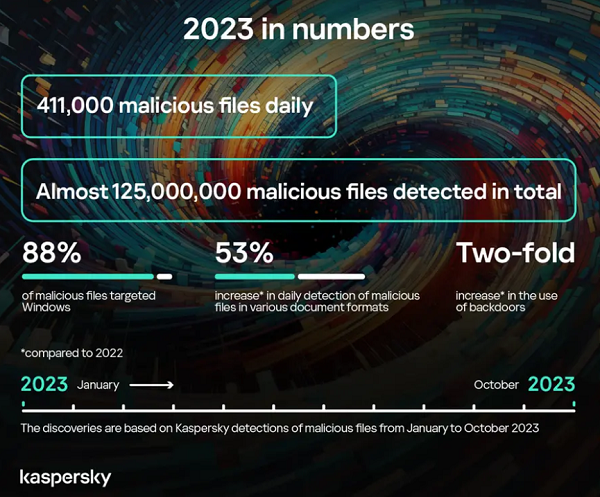Kaspersky’s latest report reveals a 3% increase in the detection of malicious files in 2023, with a daily average of 411,000 identified. The study highlights a concerning surge in attacks involving malicious documents, particularly Microsoft Office files, emphasizing the growing sophistication of cyber threats.
11 December 2023 – Kaspersky, a leading cybersecurity solutions provider, has revealed alarming statistics in its recent Security Bulletin: Statistics of the Year Report, showcasing the evolving cyber threat landscape. The report highlights a concerning 3% increase in the detection of malicious files in 2023, with an average of 411,000 such files identified daily. Particularly, attacks involving malicious Microsoft Office and various document types surged by 53%, demonstrating an escalating trend toward more sophisticated tactics by cybercriminals, including the use of backdoors to infiltrate systems undetected.
Throughout 2023, Kaspersky’s advanced detection systems flagged a staggering total of almost 125 million malicious files. Unsurprisingly, Windows remained the primary target for cyberattacks, accounting for 88% of all daily-detected malware-infested data. Noteworthy threats included malicious families distributed through diverse scripts and various document formats, constituting 10% of the daily tally of malicious files.
A substantial uptick was observed in the daily detection of malicious files in various document formats, such as Microsoft Office and PDF, experiencing a notable 53% surge to approximately 24,000 files. This increase is attributed to a rise in attacks utilizing phishing PDF files, strategically crafted to extract sensitive data from unsuspecting victims.
Trojans maintained their position as the most widespread type of malware. However, a significant development was noted in the heightened use of backdoors, witnessing a remarkable growth from 15,000 detected files per day in 2022 to 40,000 in 2023. Backdoors, known for providing attackers with remote control over victims’ systems, pose a severe threat by enabling tasks such as file manipulation, data harvesting, and monitoring computer activity.
Vladimir Kuskov, Head of Anti-Malware Research at Kaspersky, underscores the evolving threat landscape, emphasizing the increasing danger posed by adversaries employing new malware, techniques, and methods. Kuskov highlights the expanding entry barrier into cybercrime, fueled by the proliferation of artificial intelligence used by attackers, particularly in crafting convincing phishing messages.
Kaspersky recommends vigilant cybersecurity practices for users, including cautious downloading, strong password creation, regular updates, and the use of reliable security solutions such as Kaspersky Premium. For organizations, the advice extends to maintaining updated software, implementing strong password policies, and adopting robust endpoint security solutions with behavior-based detection and threat intelligence integration.






